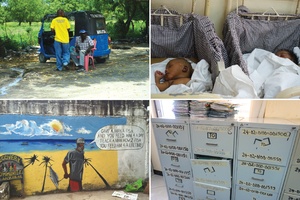Report from Tanzania: Attention to realities on the ground, criminalized populations, civil society needed to sustain HIV, TB responses
Redeployment: Opportunities to Control HIV and TB in Tanzania, Observations from Dar es Salaam, Mbeya, and Zanzibar looks at successes, challenges, gaps in public health responses, and at how to deliver “the right things to the right places at the right time.”
When we set off for Tanzania last fall, we stayed in touch with a series of posts on issues fueling HIV and tuberculosis epidemics there, and on programs addressing those issues. We also promised to return with a more in-depth look at efforts in three resource-limited and highly challenged settings to control the epidemics, to ensure all populations benefit from prevention and treatment advances three decades of research have brought, and to make those efforts sustainable and lasting.
We did that by focusing on what we heard the most from people leading, participating, and benefiting from HIV and TB outreach, care, treatment and research efforts during our time in Tanzania. In the capital city of Dar es Salaam, the remote border region of Mbeya, and the tourist destination of Zanzibar, the challenges we saw varied, but repeated themes included:
- That progress is hindered by an under-equipped and understaffed health system;
- That criminalized populations including people who inject drugs continue to go uncounted and untended;
- That civil society efforts are effective but inadequately supported;
- And that the biggest losers from all of these deficits are also the littlest: an effective system to test, treat and care for children with HIV and TB is still desperately needed.
We produced this report at a time when global health leaders worldwide have called for a closer look at realities on the ground and a reallocation of resources to meet those realities. Our visit exposed us to the tremendous impact of investments so far, the gaps and weaknesses that remain, and the fact that long-term, targeted investment is needed for a decade of unprecedented global health partnerships to bring lasting success.
Source: Science Speaks


